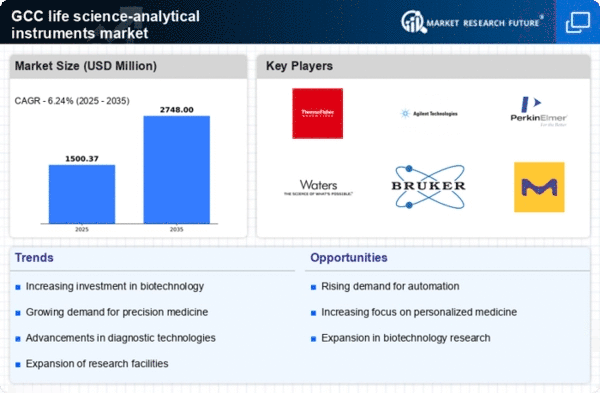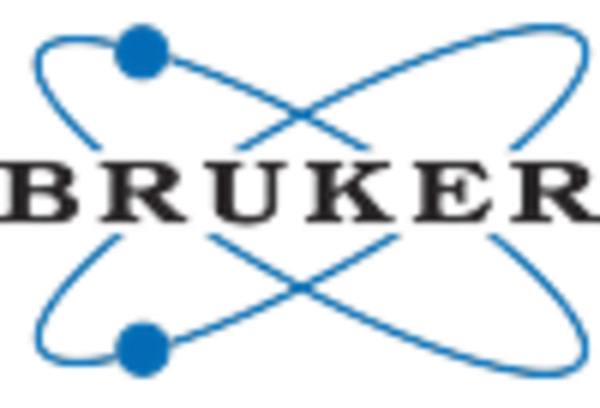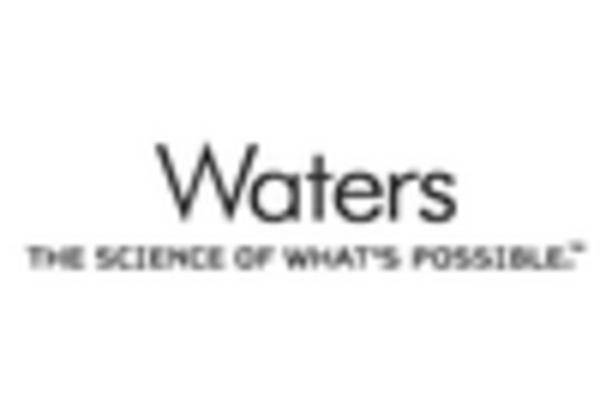Rising Demand for Precision Medicine
The life science-analytical-instruments market is experiencing a notable surge in demand for precision medicine, driven by advancements in genomics and personalized healthcare. As healthcare providers increasingly adopt tailored treatment plans based on individual genetic profiles, the need for sophisticated analytical instruments becomes paramount. In the GCC region, investments in biotechnology and pharmaceutical sectors are projected to reach $10 billion by 2026, further propelling the demand for high-precision analytical tools. This trend indicates a shift towards more targeted therapies, necessitating the use of advanced life science-analytical instruments to ensure accurate diagnostics and treatment efficacy. Consequently, manufacturers are focusing on developing innovative solutions that cater to the specific needs of precision medicine, thereby enhancing their market presence and competitiveness.
Growth in Biopharmaceutical Development
The life science-analytical-instruments market is significantly influenced by the rapid growth in biopharmaceutical development within the GCC. With an increasing number of biopharma companies emerging in the region, there is a heightened need for advanced analytical instruments to support drug development processes. The biopharmaceutical market in the GCC is expected to grow at a CAGR of 8% from 2025 to 2030, indicating a robust demand for analytical tools that can facilitate research and quality control. This growth is likely to drive investments in life science-analytical instruments, as companies seek to enhance their R&D capabilities and ensure compliance with stringent regulatory standards. As a result, the market is poised for expansion, with a focus on innovative technologies that streamline biopharmaceutical production and testing.
Emergence of Advanced Analytical Techniques
The life science-analytical-instruments market is witnessing the emergence of advanced analytical techniques that are transforming research methodologies. Techniques such as mass spectrometry, chromatography, and next-generation sequencing are becoming increasingly prevalent in laboratories across the GCC. These technologies enable researchers to obtain more accurate and comprehensive data, thereby enhancing the quality of scientific investigations. The adoption of these advanced techniques is likely to drive the demand for specialized analytical instruments, as laboratories strive to keep pace with evolving research needs. Furthermore, the integration of automation and artificial intelligence in analytical processes is expected to streamline workflows and improve efficiency, further propelling the growth of the life science-analytical-instruments market.
Growing Awareness of Quality Control Standards
The life science-analytical-instruments market is significantly impacted by the growing awareness of quality control standards in the GCC. As industries such as pharmaceuticals and biotechnology expand, there is an increasing emphasis on ensuring product quality and safety. Regulatory bodies are implementing stringent guidelines that necessitate the use of reliable analytical instruments for testing and validation purposes. This trend is likely to drive investments in life science-analytical instruments, as companies seek to comply with regulatory requirements and maintain high-quality standards. In 2025, it is anticipated that the market for quality control instruments will grow by 15%, reflecting the critical role these tools play in safeguarding public health and ensuring the efficacy of products in the life sciences sector.
Increased Investment in Research and Development
The life science-analytical-instruments market is benefiting from increased investment in research and development across various sectors in the GCC. Governments and private entities are recognizing the importance of scientific research in driving economic growth and improving healthcare outcomes. In 2025, R&D spending in the GCC is projected to reach $5 billion, reflecting a commitment to fostering innovation in life sciences. This influx of funding is likely to enhance the capabilities of research institutions and laboratories, leading to a greater demand for advanced analytical instruments. As researchers seek to conduct more complex experiments and analyses, the life science-analytical-instruments market is expected to expand, providing essential tools that support cutting-edge research initiatives.
















